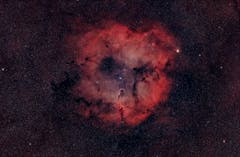Astronomik H-alpha 6nm CCD MaxFR Clip-Filter EOS XL
MaxFR Astronomik photographic narrowband-emission line filters for fast optical systems.
There is an ever-growing demand for filters suitable for extremely fast optical systems like Celestron's RASA and the Epsilon Astrographs made by Takahashi.
Our novel MaxFR emission line filters are suitable for very fast focal ratios. The new Astronomik MaxFR series of narrowband-emission line filters is perfectly matched to the requirements of astronomical deep-sky imaging with fast optical systems. For the three most important emission lines—oxygen (OIII), hydrogen (H-alpha), and sulfur (SII)—you may select filters with either 12nm or 6nm bandwidth (FWHM)
MaxFR OIII-CCD filter
6nm and 12nm FWHM
MaxFR H-alpha-CCD filter
6nm and 12nm FWHM
MaxFR SIII-CCD filter
6nm and 12nm FWHM
Highest transmission:
Our new MaxFR filters are made in a completely new way, designed to work perfectly with fast optical systems. The built-in, well-known MFR Coating technique gives you the best out-of-band blocking possible across the entire range of wavelengths from UV to IR! Your advantage is extremely high contrast, minimized stray light, no halos, and needle-sharp stars. The Astronomik MFR narrowband-emission line filters provide the best quality data, making them the ideal starting material for an awesome final image!
- 12nm MaxFR filters: Usable from f/1.7 to f/8, with about 85% maximum transmission at f/1.4 guaranteed.
- 6nm MaxFR filters: Usable from f/2.2 to f/8, with about 90% maximum transmission at f/2 guaranteed.
For maximum contrast, the SII filter is carefully designed to block all light from H-alpha and NII (nitrogen).
Imaging with Narrowband-Emission Line Filters
Imaging with narrowband-emission line filters is the best way to take great images from light-polluted sites, as they effectively block all kinds of light pollution. An H-alpha filter should be your first step into narrowband astrophotography! You can capture deep and contrast-rich images, even with heavy light pollution or a full moon in the sky. H-alpha is perfect for capturing nebulae glowing red! An OIII filter expands your imaging capabilities by allowing you to capture greenish/blueish structures, like planetary nebulae and star-forming regions. The SII filter completes your HSO filter set, letting you process your images like those from the Hubble Space Telescope.
Quality aspects of the new Astronomik MFR narrowband-emission line filters:
- MFR Coating: The 12nm filters work on systems as fast as f/1.4, and the 6nm filters as fast as f/2.
- High-Quality substrate: Made from stress- and striae-free, optically polished glass. The filters consist of ultra-thin layers on the substrate.
- Parfocal filters: All Astronomik filters are parfocal, with thickness tolerances that prevent the focal plane from shifting when changing filters.
- Coating: Coated on both sides with up to 170 layers for anti-reflection properties.
- Durability: Scratch-resistant, moisture-proof, and designed to last for years without degradation. Every Astronomik filter will deliver full performance and meet specifications even after years of use.
- Integrated Blocking: Complete blocking from UV to IR, eliminating the need for additional UV & IR blockers.
- Available Sizes: From 1.25" to 50mm x 50mm square filters.
- Delivered in a high-quality protection & storage box.
- 10-year guarantee thanks to our outstanding coating technique.
You’ll get the highest quality with every Astronomik filter, enhancing your imaging possibilities. These filters provide long-lasting performance, working as well as when they were brand new. With our special coating, the filters do not degrade over time, and the MFR coating ensures compatibility with nearly all optical systems.
Frequently Asked Questions:
- Which is the best full-width-half-maximum for me—12nm or 6nm?
It depends on your setup. For DSLR cameras and dark-current-limited cameras, 12nm filters are ideal. For extreme light pollution and cameras with low dark current, 6nm filters provide better contrast and star reduction, making them suitable for deep imaging.
- How does exposure time change with narrowband filters?
Using narrowband filters doesn’t necessarily require longer exposure times, but you can extend exposure to record fainter details without unwanted light interference. This results in clearer images, even from light-polluted areas.
MaxFR Filters for Fast Optical Systems
Choose the size and FWHM that fit your setup, and start capturing stunning deep-sky images today.
















